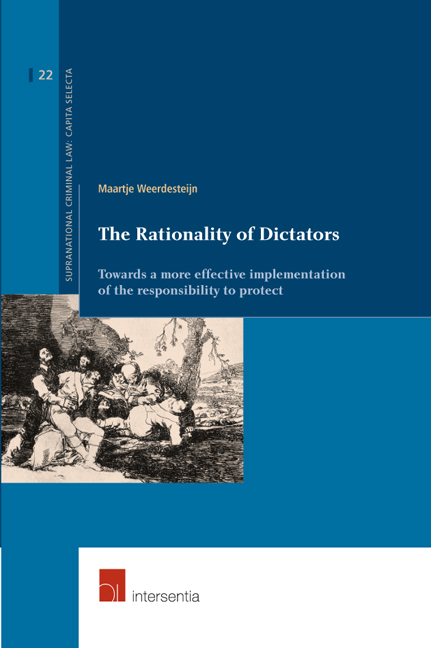 The Rationality of Dictators
The Rationality of Dictators from Part II - The Comparative Case Study
Published online by Cambridge University Press: 28 September 2018
INTRODUCTION: TIMES HAVE CHANGED
Dictators are shrouded in mystery and therefore inherently difficult to study, but this difficulty is matched by its importance as dictators continue to subject their population to horrible crimes. While they differ tremendously in the degree to which they plunge their country into a life of poverty and death, the worst forms of violence, genocide, crimes against humanity, war crimes and ethnic cleansing, occur more often in non-democratic regimes. Frequently, in those situations the dictator is not only unable to prevent them, but actually creates the circumstances in which lower level cadre feel compelled to perpetrate the crimes. The dictator can incite and legitimize the atrocities by propagating an exclusionary ideology. In addition, he is able to create the institutions in which perpetrators will feel duty-bound to perpetrate the horrible acts. Because there are often very few institutional provisions that constrain the power of the dictator and he can exert enormous influence over his regime's policies, studying him, his motivation and rationality are essential in order to bring these crimes to a halt.
After World War II, countries pledged ‘to save succeeding generations from the scourage of war’ and reaffirmed their ‘faith in fundamental human rights’ (Preamble of the UN Charter). In the years that followed, however, the focus on preventing war between countries, by respecting the sovereignty of each nation, restricted efforts to prevent or stop the perpetration of mass atrocities within states. For years, sovereignty was conceptualized in such a way that it prevented other countries or the international community from intervening in the domestic policies of a dictator who perpetrated atrocities in his own country. After the horrendous events in Rwanda and the former Yugoslavia, this idea was increasingly seen as problematic. Failing to intervene effectively to stop those horrendous crimes, as well as intervening without the authorization of the UN Security Council, as happened in 1999 in Kosovo, were both deemed unacceptable. It led Kofi Annan to ask his famous question what should be done in those instances (Annan, 2000, p. 48).
The Canadian government then brought a group of experts together to answer this important question. In 2001 they published their groundbreaking report in which they introduced ‘the responsibility to protect’. The report changed the way that sovereignty had been interpreted since WWII.
To save this book to your Kindle, first ensure no-reply@cambridge.org is added to your Approved Personal Document E-mail List under your Personal Document Settings on the Manage Your Content and Devices page of your Amazon account. Then enter the ‘name’ part of your Kindle email address below. Find out more about saving to your Kindle.
Note you can select to save to either the @free.kindle.com or @kindle.com variations. ‘@free.kindle.com’ emails are free but can only be saved to your device when it is connected to wi-fi. ‘@kindle.com’ emails can be delivered even when you are not connected to wi-fi, but note that service fees apply.
Find out more about the Kindle Personal Document Service.
To save content items to your account, please confirm that you agree to abide by our usage policies. If this is the first time you use this feature, you will be asked to authorise Cambridge Core to connect with your account. Find out more about saving content to Dropbox.
To save content items to your account, please confirm that you agree to abide by our usage policies. If this is the first time you use this feature, you will be asked to authorise Cambridge Core to connect with your account. Find out more about saving content to Google Drive.